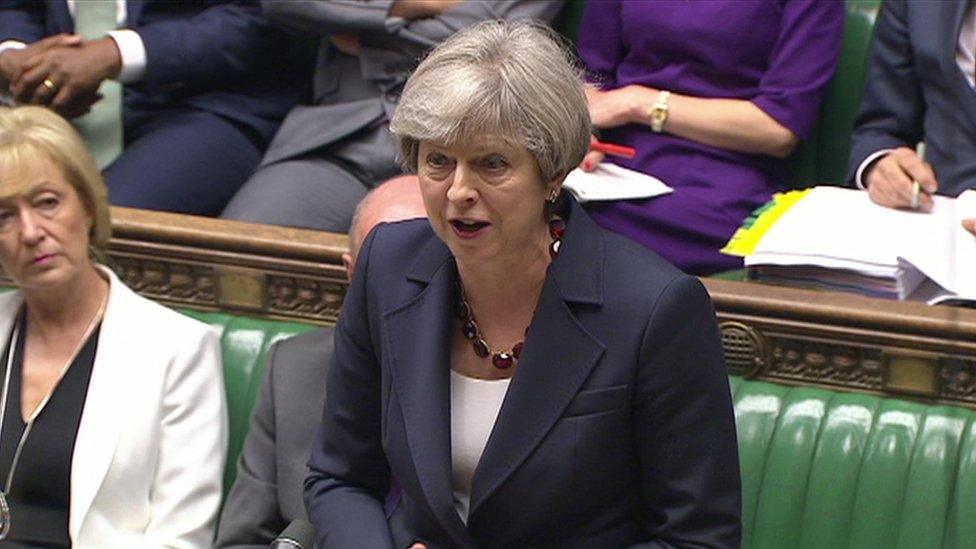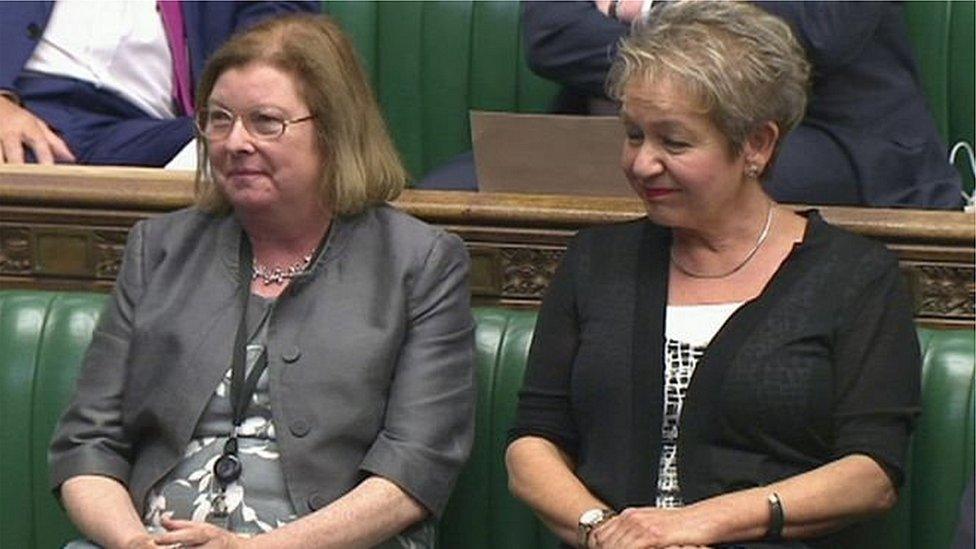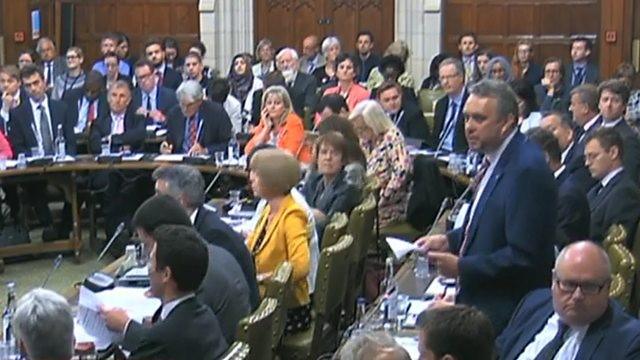Week ahead in Parliament
- Published
- comments

PMQs this week was just over 50 minutes long - Mr Speaker is letting it run on longer than the allotted half hour
The last time I noted a quiet-looking parliamentary week ahead, the prime minister went and called an election, so it is with some trepidation that I suggest that next week's agendas in the Commons and Lords look a little short of drama.
Labour MPs are on a two-line whip for a humdrum week of non-controversial legislation and several general debates, with no sign, yet, of the eagerly-awaited Great Repeal Bill, which will be the centrepiece of the forthcoming Brexit legislation.
There will be yet another mini-reshuffle of the Labour front bench after the departure of six shadow ministers who backed Chuka Umunna's cross-party Queen's Speech amendment to keep the UK inside the EU customs union and single market (interestingly, nine Labour MPs had signed the amendment but did not, in the end, vote for it - suggesting swift action by their whips).
Meanwhile over in the Lords, the voting figures on a similar amendment from the Labour peer, Lord Adonis, were interesting, external; he was supported by 58 Lib Dems, 25 Labour peers, 16 Crossbenchers and three Conservatives (Heseltine, Hogg and Wheatcroft) plus two "others" - giving a total of 104 votes for, to 172 against in a late night division on a pretty symbolic motion.
It's a respectable showing for Lord Adonis, in the face of a three-line Labour whip against him, but it also suggests that the government will only be in danger if and when the Lords Labour leadership is prepared to weigh in on Brexit votes in the Upper House.

Roberta Blackman-Woods (R) was beaten to the role of deputy speaker by Dame Rosie Winterton
Another interesting set of voting figures were those from this week's Commons election for a deputy Speaker - a poll dominated by Lindsay Hoyle, who won 354 votes, while former Labour chief whip, Dame Rosie Winterton, took 88 and Roberta Blackman-Woods 51.
Mr Hoyle was elected on the first ballot, and his second preference votes were 145 to Roberta Blackman Woods and 145 to Rosie Winterton.....so Mr Hoyle remains the senior Deputy, the Chairman of Ways and Means, and continues to look like the heir-apparent, when Speaker Bercow finally calls it a day.
As the only Conservative in the field, Eleanor Laing was elected without opposition and Rosie Winterton takes over from Natascha Engel, who lost her seat in the general election. Roberta Blackman Woods misses out, this time.
Elsewhere, every question time in the Commons will increasingly become an audition for the ambitious. This includes would-be select committee chairs, Labour dissidents seeking support, and, ever so quietly, for ministers aspiring to higher office.
Here's my rundown of the week ahead:
Monday
In the Commons (2.30 pm) MPs open with Home Office questions - and as usual, any post weekend statements from ministers or urgent questions will be taken at 3.30pm. Already, the Northern Ireland Secretary, James Brokenshire, is expected to make a statement on any developments in the talks on restoring the Northern Ireland executive and the Stormont assembly.
Legislation will be needed to restore the power-sharing agreement, or in the event that the talks fail and direct rule from Westminster is restored. Without new legislation another Assembly election would have to be called.
Then, MPs turn to the second reading debate on the Air Travel Organisers' Licensing Bill, external - this is a fairly uncontroversial measure to modernise the Air Travel Organisers' Licensing (ATOL) scheme, which provides consumer protection for package holidays that include a flight.
Finally, the Labour MP Keith Vaz leads an adjournment debate on the safety of children at theme parks - after an 11-year-old constituent, Evha Jannath, died when she fell from a "river rapids" ride at Drayton Manor theme park.
In the Lords (2.30 pm), questions to ministers include one from the Lib Dem, Baroness Walmsley, on plans to review guidance fire safety in new and existing school buildings in the light of the Grenfell Tower fire. Then there are debates on the impact of the United Kingdom's development aid budget - and on air quality in London.
Tuesday
MPs open (11.30 am) with Health questions - and assuming no ministerial statements or urgent questions are added to the agenda, they then move on to the second reading debate on the European Union (Approvals) Bill, external - there's a slightly anachronistic flavour of EU business as usual about this measure, which will approve four draft decisions of the EU Council on such subjects as the participation of Albania and Serbia as observers in the work of the EU Agency for Fundamental Rights, and on enhanced cooperation between the European Commission and the Canadian Competition Bureau.
There seems to be little expectation of controversy, because there will then be a debate on the newly-published Gibb Report, external on the chronic problems besetting the Southern Rail franchise. Expect any number of MPs living along their commuter routes to weigh in on the effects of the continuing industrial action and other problems around Southern.
But watch out for a motion on the allocation of Select Committees. This is the new carve-up agreed between the main party business managers, to decide which party provides the chair for which committee. The election means the Lib Dems will be given the Chair of the Science and Technology Committee, but it is possible not everyone will be happy with the share-out.
The list is here:, external on the order paper.
Once the motion is agreed, the Speaker will announce the dates and timings for the committee elections - the chairs should be elected by the whole House, 14 days after the motion is approved.
Nominations can be submitted as soon as the motion has been agreed by the House until 5pm the day before the ballot, which is held under the alternative vote. It now looks unlikely that the ordinary committee members will be elected (they're chose by the internal processes of the various party groups) until September.

Debates in Westminster Hall will begin again this week
The adjournment debate, on improvements to neighbourhood planning is led by the Conservative John Howell, one of the architects of the coalition government's planning reforms.
Westminster Hall sees its first debates of the new Parliament, with the DUP's Jim Shannon raising the issue of the persecution of Christians and the role of UK embassies (9.30 - 11 am).
The SNP's Alison Thewliss has a debate on the High Court judgement on benefit cap (11am-11.30am) and at 2.30pm there's a debate on the Kurdistan region in Iraq - this will mark debut in this Parliament of the All Party Parliamentary Group on Kurdistan, one of the most quietly effective all-party groups in Parliament with proceedings opened by the new chair Jack Lopresti. The debate will probably be answered by the Middle East Minister, Alistair Burt, who was brought back into government after the election, and is himself a former Vice Chair of the All-Party Group.
The Lib Dem and Orkney and Shetland MP, Alistair Carmichael, discusses support for renewable energy generation in island communities (4pm- 4.30 pm) and the Conservative Derek Thomas raises the safety of riders and horses on rural roads (4.30pm-5.30 pm).
In the Lords (2.30 pm) peers have their usual half hour of questions to ministers and then they debate a report from their International Relations Committee: The Middle East: Time for a New Realism, external and a European Union Committee report: Brexit: acquired rights, external.
Wednesday
The Commons day begins (11.30 am) with Cabinet Office questions, followed at noon by Prime Minister's Questions, which now routinely stretches well beyond the scheduled half hour, as the Speaker ensures all the backbenchers listed on the Order Paper get a chance to put their question to Theresa May.
Then MPs turn to a motion to approve the Justice and Security of Northern Ireland Act 2007, extension of duration of non-jury trails, followed by a general debate on Israel and Palestine.
In Westminster Hall there are debates on road infrastructure (9.30am); support for the Srebrenica genocide commemoration (11am); the state pension age for women (2.30pm); working conditions in the private hire industry (4pm) and the political and humanitarian situation in Yemen (4.30pm).
In the Lords (3pm) questions to ministers are followed by the second reading debate on the Financial Guidance and Claims Bill, external, which aims to ensure people can access free and impartial money guidance, pensions guidance and debt advice. It would set up a Single Financial Guidance Body. Then comes a short debate on the Centenary of the Balfour Declaration - the announcement by the then foreign secretary that the British government supported the creation of a Jewish homeland in Palestine.
Thursday
In the Commons (9.30am) International Trade questions are followed (10am) by Women and Equalities questions - where there may be some after the match analysis of the government's concession on NHS funding for women from Northern Ireland who travel to England for abortions.
A new exhibition in Parliament recalls World War I.
Then comes the weekly Business Statement from the Leader of the House, Andrea Leadsom, with MPs keen to discover when key Brexit legislation, particularly the Great Repeal Bill, will be brought before them.
They may also want to know when the long-promised debate on plans to move them out of the Victorian Palace of Westminster, to allow for renovation work, will take place.... if ever.
That will be followed by a general debate on Exiting the European Union and global trade - which will doubtless focus on possible trade-offs between access to the EU single market and Britain's ability to strike new trade deals across the world, post Brexit.
In the Lords (11am) questions to ministers are followed by debates on subjects chosen by backbench peers - first, on the role of businesses, including SMEs, in creating and spreading wealth, improving life chances, and contributing to the communities in which they operate.
Then, peers turn to the government's plans to protect and support victims of domestic violence and abuse, and there will also be a short debate on the promotion of financial inclusion through use of innovative financial solutions and new technology.
And even though the Commons are some way from setting up their select committees, their lordships are swinging into action on the committee corridor, with a hearing of their EU External Affairs Committee (10.05am); on common foreign and security policy after Brexit, where the witnesses include the former defence secretary and Nato Secretary-General Lord Robertson, the former foreign secretary Lord Hague of Richmond and the former EU Commissioner Baroness Ashton.
Neither House sits on Friday.